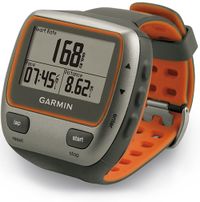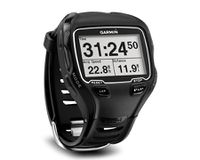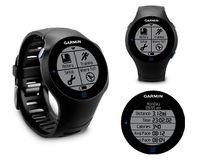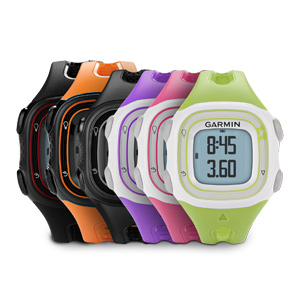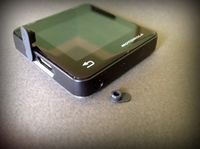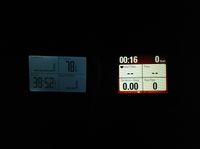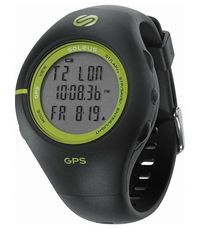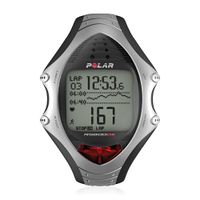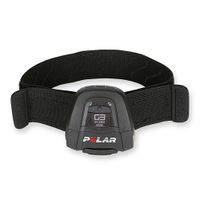Difference between revisions of "Best Running Watch"
User:Fellrnr (User talk:Fellrnr | contribs) |
User:Fellrnr (User talk:Fellrnr | contribs) |
||
| Line 1: | Line 1: | ||
| − | A good running watch can provide valuable information while you run, as well as automating your [[The importance of a training log|training log]]. This article is a concise guide to the best running watches available today at differing prices. It does not attempt to cover every watch on the market, but it does call out some to avoid. | + | A good running watch can provide valuable information while you run, as well as automating your [[The importance of a training log|training log]]. This article is a concise guide to the best running watches available today at differing prices. It does not attempt to cover every watch on the market, but it does call out some to avoid. __NOTOC__ |
| − | __NOTOC__ | ||
=Summary= | =Summary= | ||
| − | This is a summary of my recommendations. | + | This is a summary of my recommendations. Note that the prices shown below reflect the last time I checked, and the prices to fluctuate from time to time. |
{| class="wikitable" | {| class="wikitable" | ||
! Watch | ! Watch | ||
| Line 15: | Line 14: | ||
| The best watch<span style='color:#FF0000'> </span>for nearly every runner. | | The best watch<span style='color:#FF0000'> </span>for nearly every runner. | ||
| {{Garmin 310XT with HRM}} | | {{Garmin 310XT with HRM}} | ||
| − | $ | + | $180 |
| {{Garmin 310XT without HRM}} | | {{Garmin 310XT without HRM}} | ||
| − | $ | + | $175 |
| + | | {{Garmin HRM}} | ||
| + | | {{Garmin Footpod}} | ||
| + | |- | ||
| + | | {{Garmin 910XT}} | ||
| + | | A version of the 310XT with a few extra features.<br>Better for swimmers & adds an altimeter. | ||
| + | | {{Garmin 910XT with HRM}} | ||
| + | $450 | ||
| + | | {{Garmin 910XT without HRM}} | ||
| + | $400 | ||
| {{Garmin HRM}} | | {{Garmin HRM}} | ||
| {{Garmin Footpod}} | | {{Garmin Footpod}} | ||
| Line 30: | Line 38: | ||
| {{Garmin Footpod}} | | {{Garmin Footpod}} | ||
|- | |- | ||
| − | | {{Garmin | + | | {{Garmin 10}} |
| − | | | + | | Small and cheap. |
| − | | | + | | Not supported |
| − | + | | {{Garmin 10}} $130 | |
| − | | {{Garmin | + | | Not supported |
| − | $ | + | | Not supported |
| − | | | ||
| − | | | ||
|- | |- | ||
| {{Motoactv}} | | {{Motoactv}} | ||
| Line 48: | Line 54: | ||
|- | |- | ||
| {{Soleus 1.0}} | | {{Soleus 1.0}} | ||
| − | | Remarkably cheap. | + | | Remarkably cheap, but limited. |
| Not supported | | Not supported | ||
| {{Soleus 1.0}} | | {{Soleus 1.0}} | ||
| − | $75 | + | $75-85 |
| Not supported | | Not supported | ||
| Not supported | | Not supported | ||
| Line 86: | Line 92: | ||
| Good (20hr) | | Good (20hr) | ||
| No | | No | ||
| + | |- | ||
| + | | {{Garmin 910XT}} | ||
| + | | Yes | ||
| + | | Yes | ||
| + | | Yes | ||
| + | | Yes | ||
| + | | Good (20hr) | ||
| + | | Yes | ||
|- | |- | ||
| {{Garmin 610}} | | {{Garmin 610}} | ||
| Line 95: | Line 109: | ||
| No | | No | ||
|- | |- | ||
| − | | {{Garmin | + | | {{Garmin 10}} |
| Yes | | Yes | ||
| + | | No | ||
| + | | No | ||
| Yes | | Yes | ||
| − | | | + | | Poor (5hr) |
| − | + | | No | |
| − | |||
| − | | | ||
|- | |- | ||
| {{Motoactv}} | | {{Motoactv}} | ||
| Line 171: | Line 185: | ||
* The price is quite high, listing at $350 or $400 including the heart rate monitor. | * The price is quite high, listing at $350 or $400 including the heart rate monitor. | ||
* Not the range of accessories that the 910XT/310XT has, such as power meter for cycling. | * Not the range of accessories that the 910XT/310XT has, such as power meter for cycling. | ||
| + | * No display of course maps. | ||
| + | |||
| + | =Budget - Garmin 10= | ||
| + | The {{Garmin 10}} is the cheapest GPS enabled watch that Garmin makes, and price wise it fits between the cheaper {{Soleus 1.0}} and the more expensive {{Garmin 310XT}}. I think it's worth the extra $30 over the {{Soleus 1.0}} for the ability to download data and automatically maintain your [[The importance of a training log|training log]]. However, the price of the {{Garmin 310XT}} has been steadily falling, and I believe the upgrade is well worth the price difference if you can afford it and don't mind a larger watch. | ||
| + | [[File:Garmin10.jpeg|right|none|500px|The {{Garmin 10}} showing the variety of colors and the two sizes that are available.]] | ||
| + | |||
| + | ==Garmin 10 Pros== | ||
| + | * Smaller than the 310XT/305/205 and closer to the size of a traditional watch. | ||
| + | * Available in two sizes with either a 2.5cm or a 2.1cm screen, as well as several colors. | ||
| + | * The limited functionality makes it easy to use. | ||
| + | |||
| + | ==Garmin 10 Cons== | ||
| + | * The battery life is rather short. It is claimed to provide 5 hours, and this is likely to cause an issue for slower marathon runners or ultrarunners. | ||
| + | * Not the range of accessories that the 910XT/310XT has, such as [[Heart Rate Monitor]] or [[Footpod]]. | ||
* No display of course maps. | * No display of course maps. | ||
| Line 206: | Line 234: | ||
=The Cheapest – Soleus 1.0= | =The Cheapest – Soleus 1.0= | ||
[[File:Soleus10.jpg|none|thumb|200px|The Soleus 1.0]] | [[File:Soleus10.jpg|none|thumb|200px|The Soleus 1.0]] | ||
| − | The {{Soleus 1.0}} is one of the cheapest on the market | + | The {{Soleus 1.0}} is one of the cheapest on the market, with a recommended price of $99, but often available from Amazon for $75-85. While it has some significant limitations, it is basically functional. The {{Garmin 10}} is the cheapest Garmin GPS watch, but at $130 it's nearly twice the price of the Soleus 1.0. (There are other GPS watches by Soleus that have better functionality, but their price makes them unattractive when compared with the other watches here.) |
==Soleus 1.0 Pros== | ==Soleus 1.0 Pros== | ||
| − | * The big attraction of the Soleus 1.0 is the price, which is half that of the next cheapest watch I'd recommend (the | + | * The big attraction of the Soleus 1.0 is the price, which is half that of the next cheapest watch I'd recommend (the {{Garmin 10}}). |
* This is a smaller watch, similar in size to the Garmin 610. | * This is a smaller watch, similar in size to the Garmin 610. | ||
Revision as of 12:47, 22 October 2013
A good running watch can provide valuable information while you run, as well as automating your training log. This article is a concise guide to the best running watches available today at differing prices. It does not attempt to cover every watch on the market, but it does call out some to avoid.
1 Summary
This is a summary of my recommendations. Note that the prices shown below reflect the last time I checked, and the prices to fluctuate from time to time.
| Watch | Recommendation Reason | With Heart Rate Monitor | Without Heart Rate Monitor | Accessory Heart Rate Monitor | Footpod |
|---|---|---|---|---|---|
| Garmin 310XT | The best watch for nearly every runner. | Error: Could not parse data from Amazon!
$180 |
Error: Could not parse data from Amazon!
$175 |
<jfs id="B0029M3NSS" n="Garmin HRM"> | Error: Could not parse data from Amazon! |
| Garmin 910XT | A version of the 310XT with a few extra features. Better for swimmers & adds an altimeter. |
Error: Could not parse data from Amazon!
$450 |
Error: Could not parse data from Amazon!
$400 |
<jfs id="B0029M3NSS" n="Garmin HRM"> | Error: Could not parse data from Amazon! |
| Garmin 610 | Smaller than the other recommendations. | Error: Could not parse data from Amazon!
$400 |
Error: Could not parse data from Amazon!
$350 |
<jfs id="B0029M3NSS" n="Garmin HRM"> | Error: Could not parse data from Amazon! |
| Garmin 10 | Small and cheap. | Not supported | Garmin 10 $130 | Not supported | Not supported |
| Motorloa Motoactv | If you can live with the flaws, it's cheap and brilliant. | Not available as a package | Motorloa Motoactv
Varies between $150 and $250 |
<jfs id="B0029M3NSS" n="Garmin HRM"> | Error: Could not parse data from Amazon! |
| Soleus 1.0 | Remarkably cheap, but limited. | Not supported | Soleus 1.0
$75-85 |
Not supported | Not supported |
2 What to look for
There are several features to consider when looking for a runners watch.
- GPS. GPS provides an easy measure of how far you've run, which is critical for your training. While it is possible to map out a run afterwards, this tends to be tedious and is typically less accurate than GPS.
- GPS is easy to use and accurate enough for most running, but it is not accurate enough for things like interval training.
- The errors in GPS average out over a run, but they cause a problem when trying to display current pace.
- I have Analyzed the Accuracy of Some GPS watches for those interested in learning more.
- Waterproofing. Even if you don't swim, having good waterproofing is important to prevent your watch being destroyed by the rain or sweat.
- Current pace from a Footpod. A Footpod can be used to provide Cadence and in some watches it can also provide pace and distance. Unlike GPS, Footpods need to be calibrated to provide accurate pace/distance.
- Heart Rate Monitor. Heart Rate is important information when training, though it is important to understand the limitations of heart rate based training. Having a Heart Rate Monitor that will record your heart rate is particularly valuable for evaluating your training. The heart rate strap that goes across your chest can be intrusive and sometimes can chafe.
- Data Upload. The ability to record your workout and store it in a training log such as Dailymile or SportTracks is vital. All of the recommended watches here have that ability. I'd strongly advise even a new runner to store their data so that they can look back over the months and years to understand their progress. A watch that can upload to a PC makes recording your workouts much easier.
- Battery Life. How much battery life you need depends on how long you run for. It's best to have a watch that will last quite a bit longer than your longest run.
- Altimeter. An altimeter will measure the atmospheric pressure and give you altitude. This is more accurate than GPS, but will require calibration to adjust for weather related pressure changes.
Here's a table of these features foe each of the watches I recommend (all have GPS).
| Watch | Waterproofing | Pace from FootPod | Heart Rate Monitor | Data Upload | Battery Life | Altimeter |
|---|---|---|---|---|---|---|
| Garmin 310XT | Yes | Yes | Yes | Yes | Good (20hr) | No |
| Garmin 910XT | Yes | Yes | Yes | Yes | Good (20hr) | Yes |
| Garmin 610 | Yes | Yes | Yes | Yes | Fair (8hr) | No |
| Garmin 10 | Yes | No | No | Yes | Poor (5hr) | No |
| Motorloa Motoactv | Water resistant with care | No | Yes | Limited | Poor (3-6hr) | No |
| Soleus 1.0 | Yes | No | No | No | Fair (8hr) | No |
2.1 Garmin Heart Rate Monitoring
The Heart Rate Monitoring of Garmin watches is not as reliable as the Polar systems, but there are things to can do to improve this.
3 The best value - Garmin 310XT
The best value watch for most runners is currently the Garmin 310XT. It is available with a Heart Rate Monitor for around $50 more. The Garmin 910XT is better, but not worth the extra cost for most runners.
3.1 310XT Pros
- The 310XT is one of the most advanced watches available, but is no harder for a beginner to use than most alternatives. (It's easier than the 4xx series Garmin watches.)
- The 310XT is great value for money at this price level.
- A great feature is the ability to use the optional Footpod to display your current pace while using GPS for overall pace, distance and route. Only the 310XT, 910XT and Garmin 610 can do this.
- The GPS is more accurate than earlier watches, and has a faster startup time.
- The housing is fully waterproof (to 50m/160ft), so running in the rain is no problem.
- Connection to a PC is wireless, using a USB adapter. This is less hassle than any of the other options I've tried.
- The display is big enough to show four readings. I often display current pace, average pace for the current lap, average pace for the run and either heart rate or distance.
- You can upload courses and display them. This is great when running somewhere unfamiliar.
- There are several optional extras for the 310XT, including the already mentioned Footpod and heart rate strap. For cyclists there is also a speed/cadence sensor and it works with various power sensors.
- The vibration alert works nicely. I often run with the 310XT set to record a lap every mile, and it will vibrate as well as beep.
3.2 310XT Cons
- Some people find the 310XT to be rather large, and it is much larger than a normal watch.
- The battery life is good for about 16-20 hours, which is enough for most people. Ultrarunners doing 100 mile or longer races will find this a problem, though it is possible to recharge it while in use.
- For races where the GPS track is not important, you can extend the battery life by turning off the GPS receiver and use the Footpod. After 12 hours of running I still had 85% of the battery left. If you're running on a reasonable smooth surface, the Footpod is often more accurate than GPS.
4 For Swimmers - Garmin 910XT
The Garmin 910XT is a version of the 310XT with extra features, but it's about $150-$200 more expensive. It can record laps when swimming, and is better at recording altitude, but it's only recommended if you need those features. If you don't need them, then the 310XT is better value. (It's available with the Heart Rate Monitor as Error: Could not parse data from Amazon!.) Nearly all of the pros and cons of the 310XT apply to the 910XT, so I won't repeat them here.
4.1 910XT Pros
- The 910XT can record swimming, but it does this with an accelerometer rather than GPS. You have to tell the 910XT how long the pool is, but it will detect each lap, as well as your stroke.
- The 910XT has a barometric altimeter, which is far more accurate at recording altitude changes than GPS.
4.2 910XT Cons
- The biggest downside for most people is the price, which is $100 more than the 310XT.
- While the 910XT is slightly slimmer than the 310XT, it is still rather large, and it is much larger than a normal watch.
5 Smaller – Garmin 610
The Garmin 610 is smaller and overcomes many of the issues seen in the 4xx range (see below).
5.1 610 Pros
- Smaller than the 310XT/305/205 and closer to the size of a traditional watch.
- Like the 310XT, it can use the optional Footpod to display your current pace while using GPS for overall pace, distance and route. Only the 310XT, 910XT and 610 can do this (so far).
- The touchscreen interface works with gloves and in the rain, unlike most touchscreens found on phones or media players.
- Good GPS accuracy (uses the SiRF SiRFstarIV with the Instant Fix II)
5.2 610 Cons
- The battery life is rather short. It is claimed to provide 8 hours, but based on experience with other Garmin devices, the actual live may be quite a bit less. This is likely to cause an issue for slower marathon runners or ultrarunners.
- The price is quite high, listing at $350 or $400 including the heart rate monitor.
- Not the range of accessories that the 910XT/310XT has, such as power meter for cycling.
- No display of course maps.
6 Budget - Garmin 10
The Garmin 10 is the cheapest GPS enabled watch that Garmin makes, and price wise it fits between the cheaper Soleus 1.0 and the more expensive Garmin 310XT. I think it's worth the extra $30 over the Soleus 1.0 for the ability to download data and automatically maintain your training log. However, the price of the Garmin 310XT has been steadily falling, and I believe the upgrade is well worth the price difference if you can afford it and don't mind a larger watch.
6.1 Garmin 10 Pros
- Smaller than the 310XT/305/205 and closer to the size of a traditional watch.
- Available in two sizes with either a 2.5cm or a 2.1cm screen, as well as several colors.
- The limited functionality makes it easy to use.
6.2 Garmin 10 Cons
- The battery life is rather short. It is claimed to provide 5 hours, and this is likely to cause an issue for slower marathon runners or ultrarunners.
- Not the range of accessories that the 910XT/310XT has, such as Heart Rate Monitor or Footpod.
- No display of course maps.
7 Brilliant, but flawed – Motorola Motoactv
The discontinued Motorloa Motoactv was a revolutionary running watch, using a color touch screen, GPS and including an MP3 player. It was more like a smartphone than a traditional GPS watch; the Motoactv was brilliant, but it was also flawed. When it was originally introduced at $250, these flaws were too severe for it to compete with the Garmin alternatives. The price of the Motoactv tends to vary, but it is often available for under $150, and at that price the Motoactv is worthy of consideration. If you can live with each of these four flaws, then the Motoactv is a great buy. (See the cons section for more details on each.)
- Poor water resistance. Don't buy the Motoactv is you want to swim or if you're likely to forget to check the covers before your run.
- Limited battery life. If you run for less than 3 hours, you're fine with the Motoactv. If you run for between 3 and 6 hours then think carefully. If you run for more than 6 hours, look elsewhere.
- No usable 'current pace' display. Don't try to use the Motoactv to keep you on pace.
- Difficulty uploading workouts to a training log. If you want to keep an automated training log (and you should), the Motoactv will be hard work.
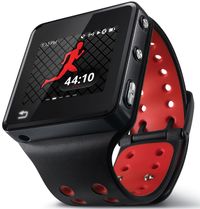 The Motorloa Motoactv with the watch strap (it's available as with a clip instead). |
7.1 Motoactv Pros
- With the recent price reduction the Motoactv is less than $150, which is far cheaper than any comparable product.
- The Motoactv is easy to use, and my family prefers using the Motoactv over Garmin products.
- The color display is nice, and the simple monochrome display of other devices seems stale and dated by comparison.
- The combination of a touch screen and physical buttons works quite well. The screen works when wet, though I found some occasional problems when there was just a drop of sweat rather than a soaking. I also found that heavy rain drops may act as screen presses, which is annoying.
- I love having a continually lit display for Running in the Dark. You can press a button on a Garmin to illuminate the display, but the Motoactv is much better.
- The inclusion of an MP3 player is nice, and it claims to learn what songs make your run harder. Personally I prefer using a separate MP3 player, but having the one device that does both has some appeal.
- The Motoactv will display a true map of the area, showing the street layout, which is a huge improvement over the breadcrumb display of the Garmin watches. If you could upload a route then this would be great for running in a new city.
- The dimensions of the Motoactv are more pleasing than the Garmin 310XT/910XT. It still has a large display, but it is much thinner.
7.2 Motoactv Cons
- The Motorloa Motoactv is discontinued, but still available.
- The Motoactv is 'water resistant' not waterproof. There are many reports of water damage and Motorola refusing to repair them. However, there are also many reports of using the Motoactv in torrential rain, which I've done myself. I suspect the issue is that the Motoactv has small covers for the headphone jack and the USB port, and if they are not in place, water can get in and destroy the watch.
- The battery life of the Motoactv is quite poor compared with other devices. If you use Bluetooth headphones and use the default setting the battery is dead in 3 hours. With no Bluetooth and the 'extended battery' setting it should last for 6 hours. This is probably plenty for most runners, but you have to remember to keep it plugged in, as the battery seems to drain faster than I would expect.
- Like any GPS watch, the display of your current pace varies too much to be of any use. This is an intrinsic problem with GPS, and I found the Motoactv was out by up to a minute/mile. This is why I recommend the Garmin 310XT/910XT/610 as they can display your current pace from the Footpod while still using the GPS for everything else. You can use the 'lap average pace' to get a reasonable idea of your pace, but if you need to hit a specific pace for a training run or a race, you're better off with one of the Garmin 310XT/910XT/610 and a Footpod.
- The Motoactv will upload your workout to Motoactv.com via a wireless network, so you don't even need a PC, which is a great idea. The problem is that it's hard to upload your workouts to any other training log. You can download each workout as a CSV file and upload it to another tool, but that sometimes requires going via a conversion program.
- The Motoactv will support a Footpod, including the Error: Could not parse data from Amazon!, and it can use the FootPod to show your pace/distance. This only works if you select to run outdoors, which turns the GPS off. The bigger problem is that there is no way of calibrating the Foodpod, so there is usually an error (for me it was out by 7%). The Motoactv does have an internal sensor that can be calibrated, but this does not work for the FoodPod. The Motoactv will use the FootPod to display your Cadence, but I found the Cadence display to vary widely; my Garmin would show a steady cadence value when the Motoactv was swinging widely.
8 The Cheapest – Soleus 1.0
The Soleus 1.0 is one of the cheapest on the market, with a recommended price of $99, but often available from Amazon for $75-85. While it has some significant limitations, it is basically functional. The Garmin 10 is the cheapest Garmin GPS watch, but at $130 it's nearly twice the price of the Soleus 1.0. (There are other GPS watches by Soleus that have better functionality, but their price makes them unattractive when compared with the other watches here.)
8.1 Soleus 1.0 Pros
- The big attraction of the Soleus 1.0 is the price, which is half that of the next cheapest watch I'd recommend (the Garmin 10).
- This is a smaller watch, similar in size to the Garmin 610.
8.2 Soleus 1.0 Cons
- There is no upload of data to a PC (which also means no firmware updates).
- No support for a Heart Rate Monitor or a Footpod.
- The claimed battery life is 8 hours, which is a little short. However, I've read reports of people getting longer battery life.
- The initial acquisition of the GPS satellites is slower than the better watches like the 310XT/910XT.
9 If you need Heart Rate Variability – Polar RS800CX
I used Polar systems for many years and their quality is great. However, I find the convenience of the Garmin GPS systems to be superior and I would no longer recommend the Polar RS800CX unless you need a first rate Heart Rate Monitor that will display Heart Rate Variability.
9.1 RS800CX Pros
- Heart rate monitoring is far better than with Garmin. The RS800CX will even record each individual heart beat for analyzing Heart Rate Variability, though few people will ever make use of that feature.
- The battery life of the RS800CX is measured in months not hours. This should not be an issue for most runners.
- The RS800CX is the size of a conventional watch, and because of the long battery life, it can be used as one.
- Includes a barometer for altitude (GPS has very poor accuracy for altitude).
- There is a Polar Footpod, the Polar S3+ Stride Sensor, which works nearly as well as the Garmin equivalent, but it's larger and more expensive.
- Fully waterproof.
9.2 RS800CX Cons
- It's Expensive at around $370.
- While the RS800CX can support GPS, it requires an add-on GPS box you strap to your arm, which is a rather poor solution. The GPS has a battery life of only 20 hours and requires recharging.
- There is no display of course maps.
- This is a Heart Rate Monitor and it objects if you try to use it without the monitor.
10 Using a Smartphone
Most smartphones have a GPS built in and support various applications that allow them to function as sports watches.
10.1 Smartphone Pros
- If you already have a smartphone, this is the cheapest option.
- Carrying a phone allows you to call for help.
- You may be able to use the smartphone as an MP3 player.
- It is possible to use a Heart Rate Monitor or even a Footpod with a smartphone.
- The Polar H7 heart rate monitor works with iPhone 4S/5 for $63. This will work with RunKeeper, MapMyRun(+), EndoMondo (Pro), Runmeter, and others. (Android phones not supported.)
- The Wahoo Key is a $55 dongle that adds Ant+ support to an iPhone 4S/4/3GS. This allows you to use the <jfs id="B0029M3NSS" n="Garmin HRM">, Error: Could not parse data from Amazon! and other Ant+ accessories. It works with most apps including RunKeeper, MapMyRun(+), EndoMondo (Pro), Runmeter. Note that the dongle may cause problems finding a waterproof case.
- The Garmin Ant+ Adapter is similar to the Wahoo Key but it has limited app support.
- The Zepher HxM is a $79 (+shipping) heart rate monitor that works with Android and Blackberry phones.
- Some [Sony Ericsson android phones] have Ant+ support built in.
10.2 Smartphone Cons
- A smartphone is usually bulky and has to be mounted on your upper arm, making it hard to see the display.
- A smartphone mounted on your arm makes you a potential target for theft, reducing your safety.
- Most touchscreens do not work well with gloves, in the rain, or with sweaty hands.
- Few smartphones are waterproof, so a specialist case will be required to protect it.
- The GPS accuracy of most smartphones is not as good as the latest GPS watches.
11 Not Recommended
These watches have flaws or a price point that makes them unattractive.
11.1 Suunto Ambit
The main attraction of the Suunto Ambit is it's 50 hour battery life. However, to get the long battery life you have to select a mode which only takes a GPS fix every 60 seconds GPS fix which gives poor accuracy. Other problems that prevent me from recommending it:
- Difficulty in upload the data to other software.
- No Footpod.
- The big advantage of GPS over a footpod is it will show you a map of where you've been and with the Garmin watches, you can upload a course to follow. The Ambit does not do that type of display.
- The price; at $500 there are better options available cheaper. For the same price you could buy two 310XTs, three MOTOACTVs, or five Soleus 1.0 watches.
11.2 Garmin Fenix
Like the Suunto Ambit, the $400 Garmin Fenix claims a 50 hour battery life. However, there are reports that the battery life is much shorter in practice.
11.3 Garmin 405/405CX/410
The Garmin 4xx series watches use a touch sensitive bezel which does not work well with gloves or when wet. The Garmin 410 has an 'improved bezel', but there are still problems. I also see more people struggling at the start of marathons with the 4xx watches than all the other devices combined.
11.4 Nike+ Sportwatch
There is a lot to like about the Nike+ Sportwatch, but it has one weakness that I believe is unacceptable. The software for the Nike+ does not allow you to use the data from your runs in anything other than the Nike web site. A training log is important, and while beginners may not need one, buying a watch that prevents you from accessing your data in the future is too limiting. The Motoactv is a far more capable watch than the Nike+, though it too has some flaws.
11.5 Garmin 305/205
The 305/205 are the earlier generations of Garmin GPS watches, and occasionally they can be found quite cheap. However, with the price drop of the Motoactv, these Garmin watches no longer offer reasonable value for money.
